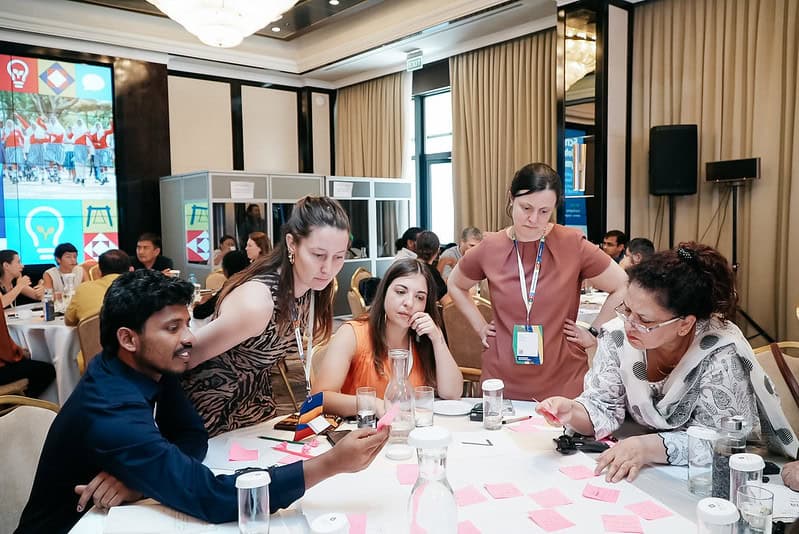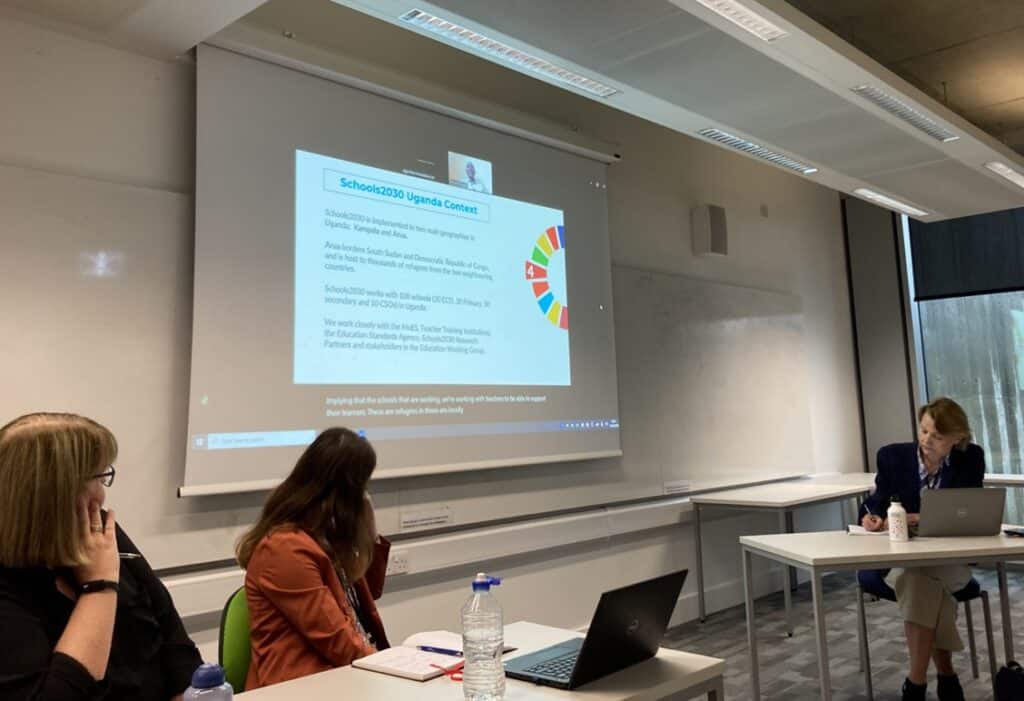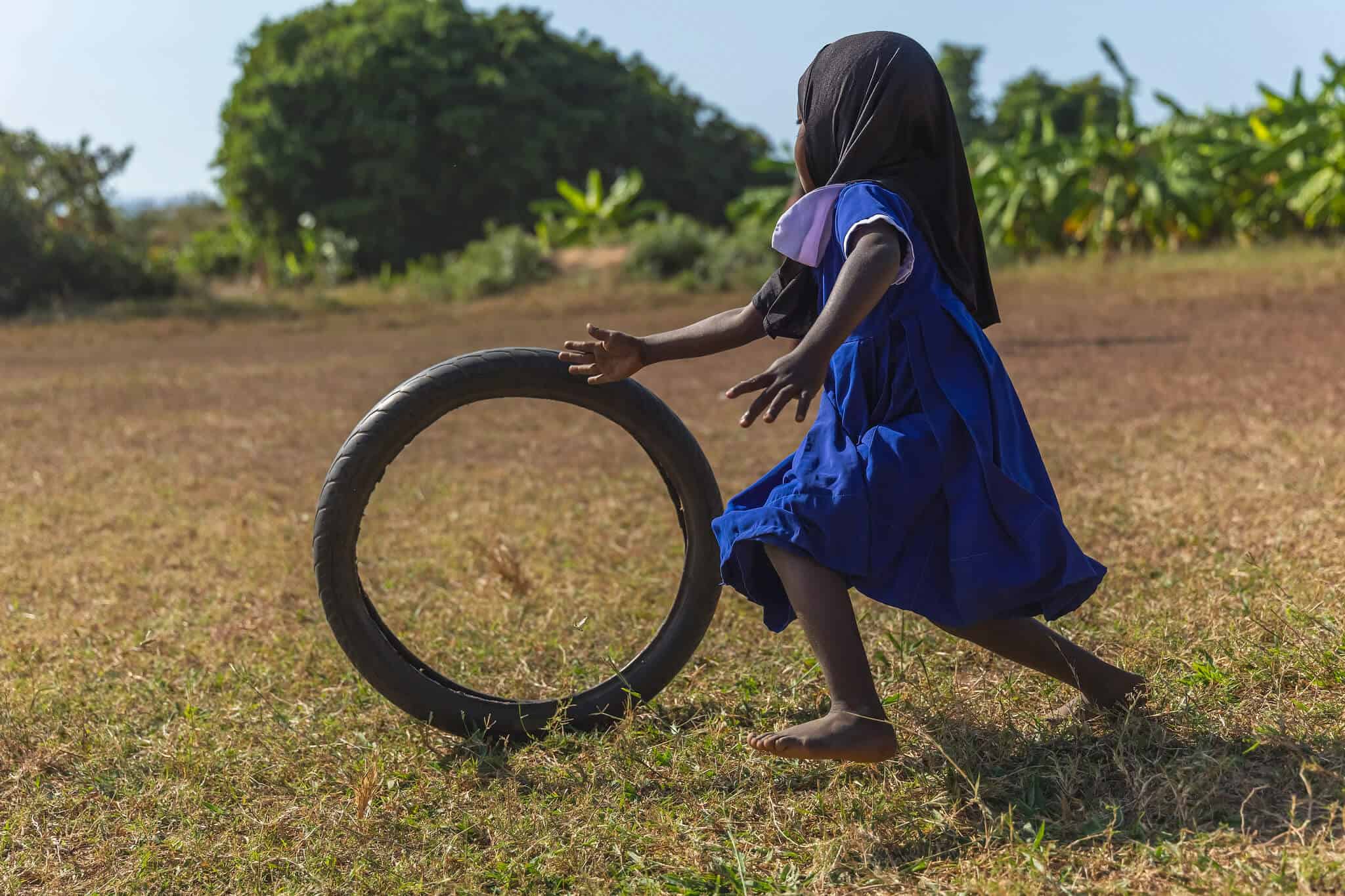Context and Background
As Schools2030 enters Phase 2 of implementation, we are taking the opportunity to reflect on the evidence we’ve gathered so far. A significant contribution to the Schools2030 evidence base has been made by our Global Research Partners, and we are excited to share key findings from the second cohort of these partners. These teams worked in Brazil, Uganda and Pakistan to explore the connection between action research, holistic skills development and educational equity. This research is vital for guiding us in promoting more equitable approaches through the Schools2030 programme.
To set the stage, Schools2030 launched its second Global Call for Research in February 2022, inviting three new research consortia to explore how educational equity could be advanced through our programme. These partners were tasked with investigating the relationship between two core elements of Schools2030: (1) Human Centred Design (HCD) and action research methodologies, and (2) pedagogical approaches aimed at holistic learning outcomes and educational equity. While the programme is designed with equity at its core, the research has the potential to deepen our understanding of how HCD and holistic skills development can reduce educational inequalities. As a result of the call, three research grants were awarded to projects in Brazil, Uganda, and Pakistan led by The School of Education, University of São Paulo (FEUSP), Open Development & Education and University of Texas at Austin respectively, each focusing on these themes within their unique educational contexts.
Evidence consistently highlights that inclusive teaching practices, which promote the inclusion of learners with special educational needs and disabilities (SEND) within mainstream classrooms, lead to improved academic attainment not just for these students, but for all learners. These practices help foster diversity, equity, and mutual support in learning environments, which ultimately enhance the educational experience for every student.1 However, teachers frequently report a need for more training and support to effectively implement inclusive teaching practices, particularly in low-resource settings. Our own research into “Understanding Learning Differences Across Schools2030 Contexts” reveals a significant gap between policy and practice in inclusive education. Many countries struggle to deliver on their inclusive education policies due to the resourcing constraints in their schools. This gap underscores the need for innovative approaches that enable teachers to meet the diverse learning needs of all students, whether those needs stem from disability, poverty, gender, or language.
Schools2030 is committed to improving teaching quality and responsiveness to the needs of all learners and seeks to achieve this through working in partnership at both the government and the school level. This will, in turn, contribute to bridging this pervasive policy-practice gap. Below we present a summary of the insights gleaned from the research exploring how to improve educational equity through the Schools2030 model.
What have we learned about action research, HCD, and educational equity?
- There is very limited evidence on the relationship between action research and educational equity
Prior to conducting their primary research, the research team at the University of São Paulo conducted a review of the global literature on action research and its influence on equity in the classroom. Their review found that there is very limited literature exploring the relationship between action research and educational equity, highlighting only two studies in particular – one on distributed leadership which led to improved student performance in language and maths, and another on a teacher training intervention designed to reduce teachers’ prejudice and bias. Though more studies were initially identified, few investigated the influence of action research on equity, had rigorous enough methods or produced conclusive results.
- Action research has potential to foster more equitable learning environments
As well as their literature review, FEUSP conducted primary research to understand teacher and student perspectives on the impact of action research on gender relations, interethnic relations, and relationships between students with and without disabilities in schools across ten states in Brazil. While the effects of action research were perceived to be subtle (which may be explained by the fact that action research was only relatively recently introduced), the results suggest that it can raise awareness about diversity and foster important dialogues about equality, both among students and teachers. For teachers, action research encouraged a reflective approach, helping them to critically analyse their perspectives on learning and adapt their teaching practices accordingly. This reflective process has been shown to influence teachers’ ability to maintain and even increase educational equity in their relationships with students. As stated in the final research report, “Action research positions local groups as subjects in the investigation of their own realities, fostering a critical examination of teaching practices and improving areas related to educational equity.”
Access FEUSP’s research brief and research report for further details.
- Similarly, there is limited evidence on teacher mindsets in low-income contexts, although evidence suggests that growth mindsets lead to teacher to use more equitable teaching practices
Researchers from the University of Texas at Austin conducted a study on teacher mindsets and specifically on how teacher beliefs about their students affect their teaching practices in Pakistan. An initial scoping review of the literature revealed that teachers’ mindsets are often not studied in the Pakistani context, despite their significant impact on educational outcomes.
However, the broader evidence base posits that teacher beliefs about their students’ abilities are linked to their self-efficacy and their goals when interacting with students. Whilst teachers who focus predominantly on high-achieving students inadvertently contribute to inequality, leading to unequal outcomes, teachers with growth mindsets, who believe that all students have the potential to learn and improve, are more likely to use responsive and equitable teaching practices.
This builds on earlier research conducted by the University of Amsterdam in collaboration with Schools2030 in Kyrgyz Republic which found that teachers believed students from lower socioeconomic backgrounds were less likely to become top students, and that there was little in their power as a teacher they could do to help those students learn. In the Kyrgyz context, teachers in schools with fewer resources were more likely to hold these kinds of beliefs, leading researchers to suggest that greater investment in resources is one way to tackle teachers’ having negative beliefs about their students.

- Aligning to teachers’ values is one way of increasing the effectiveness of HCD
Previous research conducted by the team suggested that aligning teacher interventions to teachers’ values is one important way to increase effective uptake of the desired practices. For Schoos2030 this implies that better aligning the HCD process to chime with teachers’ values may increase both uptake and effectiveness of HCD in terms of equity-related teaching practices. Primary research in Pakistan revealed that teachers most valued putting time into lesson planning and preparation. Other values that were highly ranked included being punctual to lessons and students scoring high scores in examinations. Framing HCD as a way to support teachers’ commitment to their work through effective lesson planning, preparedness to teach and as a way to improve student’s learning outcomes may therefore be an effective strategy to shift teacher attitudes towards more innovative methods such as HCD.
What have we learned about how teacher practice influences holistic skills development and educational equity?
- Warm teacher-student relationships correlate with teachers using more inclusive practices that lead to better outcomes for all students
The research conducted by Open Development & Education in primary schools in Uganda began by examining the importance of warm teacher-student relationships in fostering self-efficacy among students with disabilities, and how this in turn influences other holistic learning outcomes. The research found that when teachers build positive, supportive relationships with their students, it leads to better outcomes not only for students with special educational needs and disabilities (SEND) but for all students. Teachers who had strong, supportive relationships with their students were more likely to implement inclusive pedagogical practices that benefited the entire class.
- Teachers are eager to improve their teaching practices to support learners with SEND but would like more support
In light of these initial findings, the team decided that it was necessary to conduct a needs assessment to understand teachers’ professional development priorities regarding equitable holistic learning outcomes. The training needs identified by teachers focus on several areas for improving classroom management and supporting SEND students. Key areas of focus identified through interviews with primary teachers in Kampala included refresher courses on literacy teaching methodologies, particularly for reading comprehension, and strategies for classroom management tailored to diverse learning needs. Significantly, teachers requested clearer guidance on identifying disabilities, including debunking myths about disabilities, and how to adapt assessments and learning materials. This exercise also presented useful insights for Schools2030 in that teachers communicated that they needed to build their own understanding of the holistic learning domains, particular the non-academic domains of empathy, self-efficacy and problem-solving. They voiced that they’d like to receive support through practical resources and face-to-face workshops that can help them to use more inclusive practices in their classrooms.
- The toolkit: Holistic learning for learners with additional needs in Ugandan primary schools is a practical way forward to support Schools2030 teachers
The insights from teachers led the research team to develop a user-friendly toolkit that includes resources, strategies, and guidance designed to enhance teachers’ knowledge and practical skills to meet the requirements of learners with diverse learning needs, disabilities, or other challenges in an educational setting. The toolkit was co-developed through a design-based implementation research process with input from both teachers and Schools2030 and was iterated several times to best reflect the priorities and needs of teachers.
The toolkit features nine modules including topics such as holistic learning for learners with additional needs, teacher-learner relationships, identifying individual learner needs and linking this to a whole school approach. The toolkit is aligned to other key resources developed by the Ugandan Ministry of Education and Sports on identifying learners with additional needs.
The toolkit speaks directly to the training needs identified by Schools2030 teachers and the input provided by Schools2030 Uganda, thus promises to be a useful resource for Schools2030 to integrate into Human-Centred Design challenges and support sessions for teachers.

Access Open Development & Education’s research brief and teacher toolkit to find out more. The Toolkit for Teachers is also available for visually impaired users in EBraille and EPub formats, accessible via our research webpage.
Ways forward for Schools2030
These insights leave us with two key takeaways for the Schools2030 programme:
First, is that action research and Human-Centred Design (HCD) serve as powerful tools to promote inclusive practices in education. These approaches encourage teachers to critically examine their biases and foster a sense of curiosity among students and school communities about the challenges others face. By using teacher-led assessments alongside external examinations, which may overlook the unique contexts of individual schools, action research helps teachers address diversity in their schools more effectively. What’s more, these approaches challenge traditional teaching practices and top-down policies that often strip teachers of their autonomy, undermining their ability to respond adequately to the diversity in their classrooms. Exploring the intersection of teacher-agency and inclusion in the context of Schools2030 is something we are keen to continue exploring through our current research projects exploring teacher agency in Schools2030 contexts.
These learnings validate the ongoing efforts of Schools2030 within Brazil, Uganda, Pakistan and in our other geographies to strengthen collaborative partnerships with schools, education authorities, and universities with a view to scaling inclusive teaching approaches. However, there is still an opportunity to better align HCD with the specific needs of teachers, which is something we are addressing through a revised HCD process and updated tools.
Second, supporting the diverse needs of learners remains a top priority for educators. Teachers have shown a strong motivation to participate in training opportunities and engage in discussions focused on improving the learning experience for students with additional needs. The toolkit developed by Open Development & Education will be a valuable addition to the broader suite of Schools2030 tools, assisting teachers in designing inclusive innovations and gaining a deeper understanding of their students, particularly in Uganda. Looking ahead, we are eager to build upon these insights through a new global workstream aimed at improving learning outcomes for students with learning differences and disabilities across all Schools2030 geographies.
You can access a recording of the Schools2030 research dissemination webinar where these partners presented their findings here. We look forward to sharing more insights from Schools2030 research partners as these emerge.
